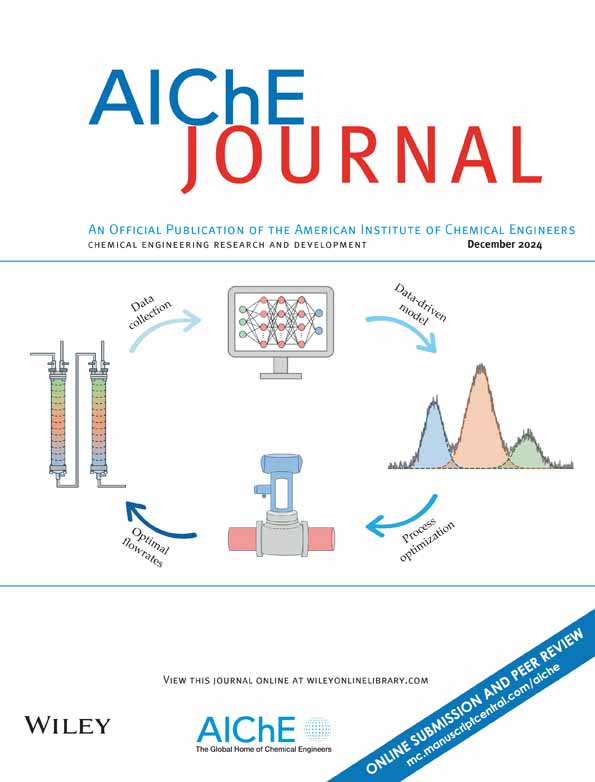Toward carbon neutrality: Single‐step polyethylene upcycling to BTX using Ni‐ZSM‐5 catalyst
IF 3.5
3区 工程技术
Q2 ENGINEERING, CHEMICAL
引用次数: 0
Abstract
Benzene, toluene, and xylene (BTX) are currently produced mainly through energy‐intensive naphtha reforming, with around half of the BTX output used for plastic production. Developing an efficient method to convert polyethylene (PE)—the most abundant plastic—into BTX is therefore critical for advancing the circular economy and achieving carbon neutrality. Here, we present a single‐step, hydrogen‐free, noble‐metal‐free catalytic process that converts waste PE into BTX with yields nearing 59%, using an unreduced Ni‐ZSM‐5 catalyst, outperforming previously reported noble‐metal or Ni‐based zeolite catalysts. The conversion of PE and long‐chain model compounds over Ni‐ZSM‐5 indicates a β‐scission pathway, as evidenced by the prominent formation of isobutene—an established β‐scission indicator. Upon Ni addition, the apparent activation energy for β‐scission decreases significantly, suggesting that Ni‐induced Lewis acidity promotes carbenium ion formation via hydride abstraction, the key step initiating β‐scission. This accelerates PE breakdown into smaller intermediates, which easily diffuse into ZSM‐5 micropores for further aromatization.迈向碳中和:利用Ni - ZSM - 5催化剂将聚乙烯单步升级为BTX
苯、甲苯和二甲苯(BTX)目前主要通过能源密集型的石脑油重整生产,其中约一半的BTX产量用于塑料生产。因此,开发一种将最丰富的塑料——聚乙烯(PE)转化为BTX的有效方法,对于推进循环经济和实现碳中和至关重要。在这里,我们提出了一种单步、无氢、无贵金属的催化工艺,使用未还原的Ni - ZSM - 5催化剂,将废PE转化为BTX,收率接近59%,优于先前报道的贵金属或Ni基沸石催化剂。PE和长链模型化合物在Ni - ZSM - 5上的转化表明了β -裂解途径,异丁烯的显著形成证明了这一点,异丁烯是一种公认的β -裂解指示剂。添加Ni后,β -裂解的表观活化能显著降低,表明Ni诱导的Lewis酸度通过氢化物提取促进了碳离子的形成,这是引发β -裂解的关键步骤。这加速了PE分解成更小的中间产物,这些中间产物很容易扩散到ZSM - 5微孔中进行进一步的芳构化。
本文章由计算机程序翻译,如有差异,请以英文原文为准。
求助全文
约1分钟内获得全文
求助全文
来源期刊

AIChE Journal
工程技术-工程:化工
CiteScore
7.10
自引率
10.80%
发文量
411
审稿时长
3.6 months
期刊介绍:
The AIChE Journal is the premier research monthly in chemical engineering and related fields. This peer-reviewed and broad-based journal reports on the most important and latest technological advances in core areas of chemical engineering as well as in other relevant engineering disciplines. To keep abreast with the progressive outlook of the profession, the Journal has been expanding the scope of its editorial contents to include such fast developing areas as biotechnology, electrochemical engineering, and environmental engineering.
The AIChE Journal is indeed the global communications vehicle for the world-renowned researchers to exchange top-notch research findings with one another. Subscribing to the AIChE Journal is like having immediate access to nine topical journals in the field.
Articles are categorized according to the following topical areas:
Biomolecular Engineering, Bioengineering, Biochemicals, Biofuels, and Food
Inorganic Materials: Synthesis and Processing
Particle Technology and Fluidization
Process Systems Engineering
Reaction Engineering, Kinetics and Catalysis
Separations: Materials, Devices and Processes
Soft Materials: Synthesis, Processing and Products
Thermodynamics and Molecular-Scale Phenomena
Transport Phenomena and Fluid Mechanics.
 求助内容:
求助内容: 应助结果提醒方式:
应助结果提醒方式:


